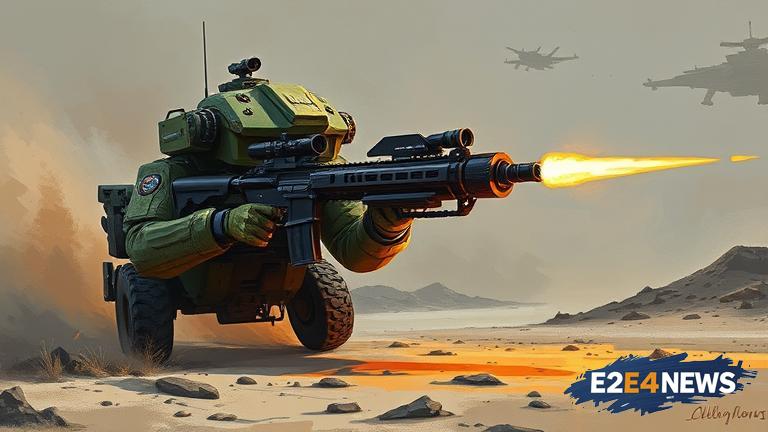The rapid evolution of defense technology is revolutionizing the way wars are fought, with a focus on leveraging cutting-edge innovations to gain a strategic advantage. The integration of artificial intelligence, cybersecurity, and autonomous systems is transforming the modern battlefield, enabling militaries to respond more effectively to emerging threats. The use of AI-powered systems, such as drones and unmanned vehicles, is becoming increasingly prevalent, allowing for enhanced surveillance, reconnaissance, and precision strikes. Furthermore, the development of advanced cybersecurity capabilities is critical in protecting against cyber threats and maintaining the integrity of military communications. The rise of autonomous systems, including unmanned aerial vehicles and ground robots, is also redefining the future of warfare, enabling militaries to conduct operations with greater speed, agility, and precision. Additionally, the increasing use of big data analytics and the Internet of Things (IoT) is providing militaries with valuable insights and enhancing their ability to make informed decisions. The defense tech revolution is also driving innovation in areas such as hypersonic systems, directed energy weapons, and advanced materials. The development of hypersonic systems, capable of traveling at speeds over Mach 5, is poised to revolutionize the way militaries conduct long-range strikes. Directed energy weapons, such as lasers and microwave systems, are also being developed to counter emerging threats, including drones and cruise missiles. Moreover, the use of advanced materials, such as nanomaterials and metamaterials, is enabling the development of lighter, stronger, and more durable military systems. The impact of the defense tech revolution will be felt across the globe, with countries investing heavily in the development of new technologies to maintain their military advantage. The United States, China, and Russia are among the countries leading the charge in defense tech innovation, with significant investments in areas such as AI, cybersecurity, and autonomous systems. The European Union is also investing heavily in defense tech, with a focus on developing advanced capabilities in areas such as cybersecurity and unmanned systems. The defense tech revolution is not without its challenges, however, with concerns over the ethics of autonomous warfare and the potential for cyber attacks on critical infrastructure. Despite these challenges, the future of defense technology looks bright, with the potential to transform the way wars are fought and won. The use of AI, cybersecurity, and autonomous systems will continue to play a critical role in modern warfare, enabling militaries to respond more effectively to emerging threats. The development of advanced materials and hypersonic systems will also be critical in maintaining a military advantage. As the defense tech revolution continues to evolve, it is likely that we will see significant advancements in areas such as quantum computing, biotechnology, and advanced propulsion systems. The potential for these technologies to transform the future of warfare is vast, with the potential to enable new capabilities such as stealth technology, advanced sensors, and enhanced communications. The defense tech revolution is a global phenomenon, with countries around the world investing in the development of new technologies to maintain their military advantage. The impact of this revolution will be felt for decades to come, shaping the future of modern warfare and redefining the way wars are fought. The use of AI, cybersecurity, and autonomous systems will continue to play a critical role in this revolution, enabling militaries to respond more effectively to emerging threats and maintain their military advantage. The future of defense technology is exciting and rapidly evolving, with significant potential for innovation and advancement in the years to come. The defense tech revolution is poised to transform the way wars are fought, with a focus on leveraging cutting-edge innovations to gain a strategic advantage. The integration of AI, cybersecurity, and autonomous systems is critical in this revolution, enabling militaries to respond more effectively to emerging threats and maintain their military advantage. The development of advanced materials, hypersonic systems, and directed energy weapons will also be critical in this revolution, enabling militaries to conduct operations with greater speed, agility, and precision. The potential for the defense tech revolution to transform the future of warfare is vast, with significant implications for global security and stability. As the defense tech revolution continues to evolve, it is likely that we will see significant advancements in areas such as quantum computing, biotechnology, and advanced propulsion systems, enabling new capabilities such as stealth technology, advanced sensors, and enhanced communications.
